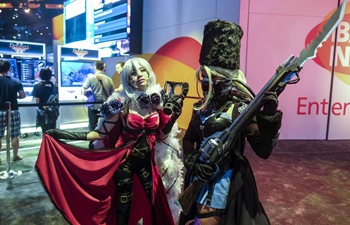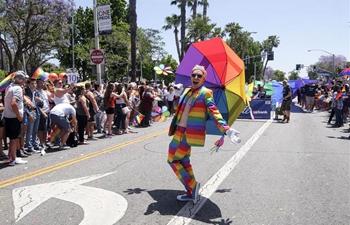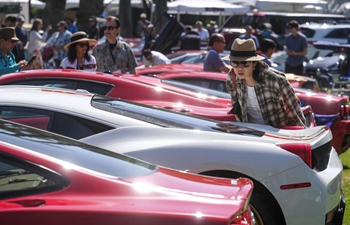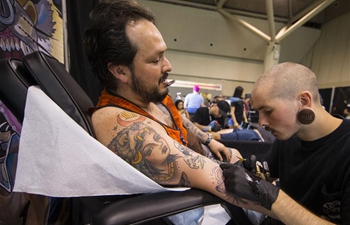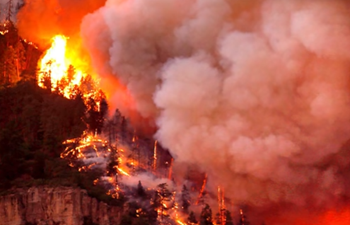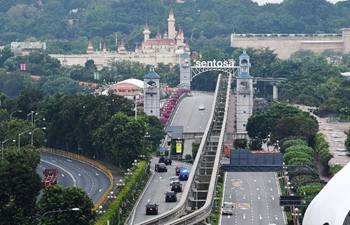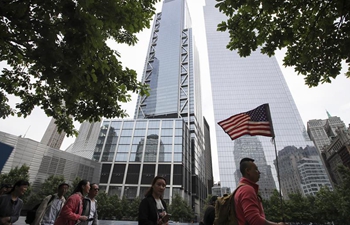By Qiu Junzhou, Yang Shilong
NEW YORK, June 12 (Xinhua) -- New York City's plan to cancel the entrance test to its specialized high schools has sparked an uproar from local Asian American community.
TO TEST OR NOT TO TEST?
Hundreds of parents and students, mostly from Asian American communities, gathered before the City Council in downtown Manhattan on Saturday, bearing signs calling "Keep the Test."
"The Test" refers to the Specialized High School Admissions Test (SHSAT), required for application to New York's eight specialized public high schools. These high schools, including Bronx High School of Science, Brooklyn Technical High School and Stuyvesant High School, provide training for high performing students and are extremely competitive.
New York mayor Bill de Blasio announced in an article on Chalkbeat, a non-profit education media outlet, "We need to scrap the SHSAT and start over." He called the existence of a single standardized test to determine success "unbelievably backward."
A more center argument to his plan and the core of debate is what he called the disproportionate racial composition of these high schools.
According to the New York Department of Education, only 10 percent of students who score well enough to gain admission to the schools are African Americans or Latino/Hispanic for the 2017-18 school year, while Asian Americans take up 62 percent.
"That makes no sense," said de Blasio at a town hall in North Brooklyn in October 2017, singling out Stuyvesant High School, who had only 3.5 percent African American and Latino students in the 17-18 school year.
The mayor has submitted bill no.A10427A to the State Assembly on April 20, 2018, proposing to reform the education system in a three-year period.
Starting 2021, seats will be reserved for students based on their rank in their school and citywide, and the remaining seats will be given to students randomly selected as long as they hold an average GPA of 3.7.
Should this bill be passed, students will no longer be able to "test in" to specialized high schools. This is a bolt from the blue for Asian students, who take up 62 percent of the current student population. To them, the administration is essentially saying, "we're going give more seats to other people - so we're going to take yours."
NYC Schools Chancellor Richard Carranza justified this bill, saying on Fox 5 New York, "I just don't buy into the narrative that any one ethnic group owns admission to these schools."
INSULTED, SIDELINED
The mayor's statement provoked a direct response from Congresswoman Grace Meng, who fired back in a statement, "I am insulted, and these comments are false."
"It's straightforward racist, based on my opinion. The argument is because there are too many Asians in these schools," said Angela, mother of two kids who are studying in Stuyvesant High School, in an interview with Xinhua.
"You can't punish the excellent people who work hard," said Angela who took part in Saturday's protest.
"There is so much that is disheartening about that sentence. It pits minority groups in our city against one another," commented Boaz Weinstein, a graduate of Stuyvesant High School on his piece on the New York Times.
"What's so troubling about City Hall's narrative around this topic is that they are discounting the fact that Asian Americans are also people of color, minorities and immigrants," said Assembly member Ron Kim on a statement to the Brooklyn Daily Eagle.
Larry Cary, president of the Brooklyn Tech Alumni Foundation, said on local television, "These are kids who do well on a test... don't do the kinds of things that middle class or upper-middle class kids can do in order to get into a school." He emphasized.
"The SHSAT is a single-plank bridge for Asian American kids," said Lilian Chen, an Asian American parent. "Now it's being hacked down by 'political correctness'."
BETTER WAY OUT?
Tom Allon, president and CEO of City & State, the New York news organization, and also alumni and former teacher at Stuyvesant Highs School, does not support canceling the test. However, he does support adding a writing component to the test for more comprehensive criteria.
A study by Sean P. Corcoran and Christine Baker-Smith at New York University Steinhardt found that reserving seats for students in the top percentage of their middle schools is most effective among six alternate admissions rules to specialized high schools.
However, they also found that this would lower academic levels of the incoming class, proving an argument that is often cited by critics of the reform policies.
Sonia Epstein, former alumnus from Stuyvesant high school, states frankly in her piece on the New York Daily News, "Without the test, Stuyvesant won't work." She believes that students will struggle to "play catch up" on the schools' "sink or swim" ethos, and this would undermine the fundamentals of specialized high schools.
"To diversify specialized schools, change has to come from every direction. We need long-term improvement of primary schools, and accessible, affordable SHSAT prep citywide," said Epstein.
"I think the test is not the problem, it's a symptom of inadequate education that's provided to predominantly black and Hispanic children in the City of New York," Said Cary.
Allon also proposes increasing the size of the pie by increasing the number of specialized high schools and making more resources available for students citywide.
Currently, the bill has not held any public hearings. It has completed the second reading and has been referred to the rules committee, before the third reading and finally passage if no opposition. However, concerns from various sources have reached sponsors of the bill, such as New York State legislators Michael Montesano and David Weprin, who have announced their retraction of sponsorship.
(Zhang Mocheng also contributed to the story)







